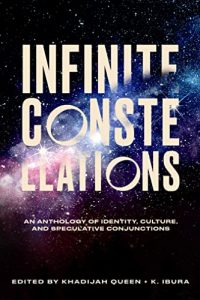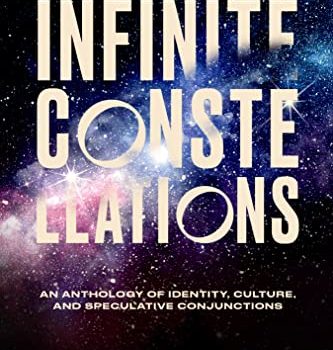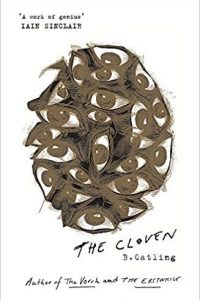Eugen M. Bacon Reviews Infinite Constellations: An Anthology of Identity, Culture, and Speculative Conjunctions edited by Khadijah Queen & K. Ibura
 Infinite Constellations: An Anthology of Identity, Culture, and Speculative Conjunctions, Khadijah Queen & K. Ibura, eds. (University of Alabama Press/FC2 978-1-57366-900-9, $24.95, 286pp, tp) March 2023. Cover by danielle c. miles.
Infinite Constellations: An Anthology of Identity, Culture, and Speculative Conjunctions, Khadijah Queen & K. Ibura, eds. (University of Alabama Press/FC2 978-1-57366-900-9, $24.95, 286pp, tp) March 2023. Cover by danielle c. miles.
Some books speak to us louder than others. Perhaps they remind us of our childhood, or our loves and hurts, our longings, terrors and dreams. I tend to accept a book for review mostly if I think I’ll connect with it. When I came across Infinite Constellations: An Anthology of Identity, Culture, and Speculative Conjunctions, I flicked through a few pages and thought, yes. Yes.
But what was it exactly about this crosslinguistic book with its poems and short stories from people of color who identify as Black, Black-Latinx, Filipino-Spanish-Chinese, Jamaican with Chinese heritage, Japanese-American, Cherokee, Euroamerican Cherokee, “a son of islands and exiles, a crossroads of multiple diasporas; my people are Cuban, Jewish, Santeros, Catholics, warriors, poets, and nerds”… that did it for me? That right there. As an African Australian migrant, a hybrid who is a sum of many, an “other,” I felt drawn to the first-person complexities and multiplicities of transmorphed identities, and the lived experiences in fiction and poetry of mis/belonging. I entered the reading blind, unfamiliar with the anthology’s editors and the work of all but one contributor.
The introduction draws attention to the anthology’s focus on human connections, transmigration, broken promises, hurricanes and storms, loss and gain, new beginnings and in-betweens, sentience in nature and animal spirits, patterns of reflection and wonderment in sonnets, verse, epigraphs and metaphor.
The poems here include the tug of ardent odes to fathers, mothers, uncles, children… including Juan J. Morales’s “Dream of a Space Tattoo”: “Inside a dream within a dream, my dad sits next to me, telling me about / a new tattoo he got to instruct us where to go.”
We meet the shame of a body there, a boy by the river, between a column of white oaks and birch trees in Wendy Chin-Tanner’s “Carville National Leprosarium, 1954”. Soham Patel’s “Hello, Ghost” resurrects an uncle and his gift of the globe that our protagonist traces their finger over, thinks of it as baby earth. More ancestral actors appear in Mary Lou Johnson’s “The Sacred Interrupted” that massages a lifetime in the silence of memory. There is light and shade in Sarah Sophia Yanni’s “How Can There Be So Much Death and Also So Much Love” – a person, who is now an object in a notebook, gleaming with agency but abstraction.
The call of ancestry pulses across the anthology, inhabiting a prowl of animal spirits (wolves, bears), bird spirits (crows, swans, owls) in a richness of language, like in dg nanouk okpik’s microlit “She Sang to Me Once at a Place for Hunting Owls”, where our first-person narrator wades through nesting ground, “fitted like a fingerprint.” And with it is repetition of the Okpikrauq River’s song vibrating off the cliffs: “People have as their names, their rivers, their rivers.”
The in-betweens that are short stories, yet maybe not, include George Abraham’s “After, Word”, which is random and abstract, imprinted with muscle memory of birthright from the core of a queer Palestinian: “Aren’t you tired of trying to fill? That void.”
Memorable fiction includes Lynn C. Pitts’s “The Swan” with protagonist Joy, who is laying clutches of feathers from her crotch, and links back to a one-nighter with a beautiful nameless black man, and the encouragement of her friends Nicole and Carla to dig to the roots of this anomalous happening: “Bitch, we way past weird.” This humorous story unravels gods and goddesses, and has strong themes of body image and trust. Cindy Juyoung Ok’s “Red Green Blue” navigates around travel, tourism and relationships to scrutinise lifelong desire and the intensity of unrequited same-sex love.
Thea Anderson’s short story “Antelope Canyon Hotel” is a cultural story of inhabitation, a first-person perspective of a ghost dying for companionship and who refuses to forget. Shakira Peterson’s “On Bended Knee”, uniquely written in lower case, with its characters jamal and nypa, is a voodooist story of a soul reborn – chewed to life, sewn, crafted and shipped across waters:
The woman cries as she folds him into a small shipping container. six drops fall on him, right near his center. she rubs her hands across this part of his fabric to disguise the moisture. this will be the last time they will come in contact in this world, but her energy will never leave him.
There’s much to love about Infinite Constellations. Perhaps what the introduction doesn’t do well is contextualise the anthology for the unsuspecting reader, who might not be much poetry-inclined, or long-prose-inclined, given the difference in length and form of work here which may narrow the intended audience. The anthology’s literary bent may exclude it from readers of commercial fiction, as the book is not intended for them. It aims for the literary-aware reader, who will treasure it.
Closing the anthology, editors Khadijah Queen & K. Ibura offer notes and acknowledgement, a reading and teaching guide with editorial interrogations, textual conversations – calling out prose poems, guiding the reader through creative interpretations, interrogations of form and device, thematic assessments and venturing between the lines. Infinite Constellations: An Anthology of Identity, Culture, and Speculative Conjunctions is a solemn beauty, a bold and experimental cultural degustation.
Eugen M. Bacon, MA, MSc, PhD, is African Australian, a computer graduate mentally re-engineered into creative writing. She studied at Maritime Campus, less than two minutes’ walk from The Royal Observatory of the Greenwich Meridian. She’s a 2022 World Fantasy Award finalist, and was announced in the honor list of the 2022 Otherwise Fellowships for ‘doing exciting work in gender and speculative fiction’. Her book Danged Black Thing made the 2021 Otherwise Honor List as ‘a sharp collection of Afro-Surrealist work’. Eugen has won or been commended in international awards, including the Foreword Indies Awards, BSFA Awards, Bridport Prize, Copyright Agency Prize, Horror Writers Association Diversity Grant, Otherwise, Rhysling, Elgin, Aurealis, Australian Shadows, Ditmar and Nommo Awards for Speculative Fiction by Africans. Eugen’s creative work has appeared in literary and speculative fiction publications worldwide, including Award Winning Australian Writing, Fantasy Magazine, Fantasy & Science Fiction, and Year’s Best African Speculative Fiction. New releases: Mage of Fools (novel), Chasing Whispers (collection), An Earnest Blackness (essay collection).
This review and more like it in the June 2023 issue of Locus.
 While you are here, please take a moment to support Locus with a one-time or recurring donation. We rely on reader donations to keep the magazine and site going, and would like to keep the site paywall free, but WE NEED YOUR FINANCIAL SUPPORT to continue quality coverage of the science fiction and fantasy field.
While you are here, please take a moment to support Locus with a one-time or recurring donation. We rely on reader donations to keep the magazine and site going, and would like to keep the site paywall free, but WE NEED YOUR FINANCIAL SUPPORT to continue quality coverage of the science fiction and fantasy field.
©Locus Magazine. Copyrighted material may not be republished without permission of LSFF.






